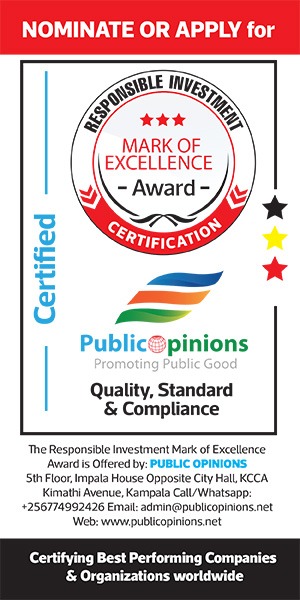National Planning Authority  is a Winner of the 2019 Uganda Responsible Investment Award (URI Award) held on 22nd November 2019 at Imperial Royale Hotel Kampala during a High Level Uganda Responsible Investment Summit and Award Ceremony presided over by H.E Yoweri Kaguta Museveni President of the Republic of Uganda and Hon Evelyn Anite Minister of State for Privatisation and Investment. The 2019 Uganda Responsible Investment Summit and Award Ceremony was organised by Public Opinions and Office of the Minister of State for Privatisation and Investment. The award is offered to Companies and organisations which promote and uphold International Best Standards and Practices and have made tremendous contributions towards attainment of Uganda Vision 2040 and the United Nations Sustainable Development Goals.
is a Winner of the 2019 Uganda Responsible Investment Award (URI Award) held on 22nd November 2019 at Imperial Royale Hotel Kampala during a High Level Uganda Responsible Investment Summit and Award Ceremony presided over by H.E Yoweri Kaguta Museveni President of the Republic of Uganda and Hon Evelyn Anite Minister of State for Privatisation and Investment. The 2019 Uganda Responsible Investment Summit and Award Ceremony was organised by Public Opinions and Office of the Minister of State for Privatisation and Investment. The award is offered to Companies and organisations which promote and uphold International Best Standards and Practices and have made tremendous contributions towards attainment of Uganda Vision 2040 and the United Nations Sustainable Development Goals.
National Planning Authority was established by the NPA Act (15 of 2002) in accordance with Article 125 of the 1995 Constitution of the Republic of Uganda. The Authority was established on backdrop of the need for:
Building the national capacity for visionary and long term planning. The Authority would establish a framework that enable the short and medium term national priorities to be derived from and guided by agreed strategic objectives, long term development goals and perspective vision aspirations.
Having in place an institution that will be responsible for ensuring a sustainable and balanced national development by integrating economic, social and political dimensions of development with spatial and environment aspects.
Creation of policy and institutional arrangements that will facilitate systematic integration of district plans into national development plans i.e. integrating decentralized and national development planning processes.
Establishment of a central forum for participatory development planning through sharing of ideas by different stakeholders and agreeing on courses of action. This would entail putting in place a consistent, efficient, co-ordinated and integrated framework and system of managing national planning for development and service delivery.
ASPIRATIONS
Nationwide consultations were conducted involving various stakeholders and consensus was reached on the following aspirations for Uganda’s future development:
- Ugandans aspire to live and work in a peaceful, secure, harmonious and stable country where the rule of law prevails and respect for fundamental human rights observed. Ugandans want a corruption free nation with strong democratic structures and systems.
- Ugandans aspire to have unity in diversity and equal opportunities irrespective of gender, tribe, ethnicity or religion. Ugandans aspire for a progressive and developmental culture that blends traditional beliefs and national values. Ugandans aspire for a future in which men, women, youth, children, and persons with disabilities are empowered to participate as equal partners in development.
- Ugandans desire to be resourceful and prosperous nationals contributing to national development through gainful employment, savings and investments.
- Ugandans desire to have access to affordable quality health and education services. Ugandans aspire for a healthy, literate and well informed society. We desire to live in clean and well planned settlements with access to all social amenities. Uganda aspires to be a society free of hunger with strong social safety nets.
- Ugandans desire to have world class infrastructure and services, and modern technology to improve productivity and production. Ugandans also aspire to have access to clean, affordable and reliable energy sources to facilitate industrialization.
- Ugandans desire a green economy and clean environment where the ecosystem is sustainably managed and the livability of the urban systems greatly improved.
- Ugandans aspire for a highly moral and ethical society whose citizens are strong in religious and spiritual values, and instilled with the highest of ethical standards. A society in which people practice and profess their customs, cultures and religious beliefs and yet, feeling that they belong to one nation.
These aspirations, as well as emerging development opportunities and global trends, provide a basis and foundation for the realization of the Vision 2040.
THE VISION
Uganda Vision 2040 provides development paths and strategies to operationalize Uganda’s Vision statement which is
“A Transformed Ugandan Society from a Peasant to a Modern and Prosperous Country within 30 years” as approved by Cabinet in 2007.
This involves changing from a predominantly low income to a competitive upper middle income country within 30 years.. It is envisaged that the country will graduate to the middle income segment by 2017 and reach a per capita of USD 9,500 by 2040.
The Vision 2040 is conceptualized around strengthening the fundamentals of the economy to harness the abundant opportunities around the country.
The identified opportunities include:
› Oil and gas
› Tourism
› Minerals
› ICT Business
› Abundant Labour Force
› Geographical Location and Trade
› Water Resources
› Industrialisation and
› Agriculture
among others that are to date considerably under-exploited.
To achieve our vision the average real GDP growth rate will have to be consistent at about 8.2 per cent per annum translating into total GDP of about USD 580.5bn with a projected population of 61.3 million in 2040.
This will depend on the country’s capacity to strengthen the fundamentals to harness the opportunities. The fundamentals include: infrastructure (energy, transport, water, oil and gas,and ICT); Science, Technology, Engineering and Innovation (STEI); land use and management; urbanisation; human resource; and peace, security and defense.
The Vision attributes, which are consistent with the principles of the constitution, are:
(a) Independence and sovereignty;
(b) Democracy and the rule of law;
(c) Stability and peace;
(d) Knowledgeable and skilled;
(e) Able to exploit and use its resources gainfully and sustainably;
(f) In a strong federated East Africa with an effective African Common Market and a strong African Defense Mechanism.
KEY VISION STRATEGIES
- Review the architecture of government service delivery system to act as a unit, harness synergies and deliver public services efficiently and effectively.
- Government will invest directly in strategic areas to stimulate the economy and facilitate private sector growth.
- Pursue an urbanization policy that will bring about better urban systems that enhance productivity, livability and sustainability.
- Government will pursue policies aimed at leapfrogging in the areas of innovation, technology and science, engineering, human resource development, public sector management, and private sector development.
- Develop and implement a National Innovation System that will help in initiating, importing, modifying and diffusing new technologies.
- Government will front-load investments in infrastructure targeting areas of maximal opportunities with focus on oil, energy, transport and ICT.
- Accelerate industrialization through upgrading and diversification to effectively harness the local resources, offshoring industries and developing industrial clusters along the value chain.
- To develop and nurture a national value system by actualizing a national service programme to change mind sets and promote patriotism and national identity.
- The vision will be implemented in accordance with existing and future agreements, standards and protocols within the framework of regional integration.
NATIONAL PLANNING AUTHORITY
Planning House
Plot 17B Clement Hill Road
P.O Box 21434
Kampala, Uganda
Tel: +256-414- 250229/+256-312-310730
Email: [email protected]
Web: www.npa.ug
Published and Disseminated by;
Public Opinions International
P.O Box 35297 Kampala-Uganda
Tel: +256 414 697750,+256712936206
Whatsapp:+256701992426
Email: a[email protected]



















